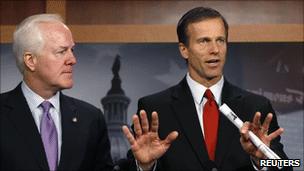US tax cuts: Senate passes compromise deal
- Published

Some conservative Republicans, including John Cornyn, left, and John Thune, objected to the deal
The US Senate has passed a compromise tax bill averting a New Year rise in income taxes for millions of Americans.
The deal forged by the White House and Republicans also extends unemployment pay for those out of work for nearly two years.
The bill's chances are less certain in the House of Representatives, where some Democrats are angry about tax breaks for wealthy Americans.
President Barack Obama said compromise was needed to win Republican support.
With the bill having passed overwhelmingly in the Senate, the $858bn (£542bn) package now heads to the House, and Mr Obama urged quick action in that body.
"I know there are different aspects of this plan to which members of Congress on both sides of the aisle object," he said on Wednesday.
"That's the nature of compromise. But we worked to negotiate an agreement that's a win for middle-class families and a win for our economy, and we can't afford to let it fall victim to either delay or defeat."
Under a proposal that the White House crafted with Republicans and announced last week, tax cuts enacted by President George W Bush in 2001 and 2003 and set to expire this year would be extended at all levels - including for the wealthiest Americans.
Some unemployment benefits would also continue, the estate tax would be lowered, and payroll taxes would be cut for a year in a bid to spur consumer spending.
Mr Obama and his Democratic allies had vigorously opposed allowing low tax rates for wealthy Americans to continue at a time of massive budget deficits, but Senate Republicans rejected Mr Obama's preferred approach and the president said he saw no option other than compromise.
When Mr Obama announced the deal last week he said the deal was the only way to avoid damage to American families and the economy that he said would ensue if taxes rise and long-term unemployment benefits were not extended.
As liberals in Washington have railed against the deal, a growing number of conservatives have also taken up opposition.
They note the bill adds to the US budget deficit and object that the low tax rates are only temporary.
- Published13 December 2010
- Published10 December 2010
- Published9 December 2010